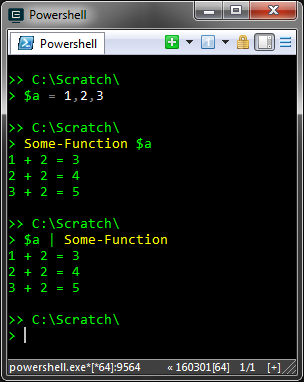Useful PowerShell scripts
Signing powershell scripts
Extracted from an blog post by Scott Hanselman
Create a Local Certificate Authority certificate
makecert -n "CN=PowerShell Local Certificate Root" -a sha1 -eku 1.3.6.1.5.5.7.3.3 -r -sv root.pvk root.cer -ss Root -sr localMachine
Make a personal certificate from the previously created root certificate
makecert -pe -n "CN=PowerShell User" -ss MY -a sha1 -eku 1.3.6.1.5.5.7.3.3 -iv root.pvk -ic root.cer
Verify the certificates in PowerShell
Get-ChildItem cert:\CurrentUser\My -codesign
Sign a script
Set-AuthenticodeSignature c:\foo.ps1 @(Get-ChildItem cert:\CurrentUser\My -codesign)[0]
Hash tables
Content shamelessly stolen from SS64
Initialise the Hash Table
$array_name = @{key1 = item1; key2 = item2;...}
# Keep fields ordered with [Ordered]
$array_name = [Ordered]@{key1 = item1; key2 = item2;...}
Add items to a Hash Table
$usa_states.Add("GA", "Goregia")
Edit items in a Hash Table
$usa_states.Set_Item("GA", "Georgia")
Combine Hash Tables
$world_states = $usa_states + $india_states
Remove items from a Hash Table
$usa_states.Remove("GA")
Retrieve items from a Hash Table by key
$usa_states.'NY'
Pipeline-friendly function
function Some-Function {
Param (
[parameter(
ValueFromPipelineByPropertyName = $true,
ValueFromPipeline = $true)]
[int[]]$SomeValue)
Process {
$SomeValue | % {
# Do the stuff here on each value item
"$_ + 2 = $($_ + 2)"
}
}
}

Miscellaneous
Search for a range of files
gci has a filter (-fi) parameter, but only accepts a single string.
Sometimes you want to provide a number of filters. You can use include
(-i) to achieve this, but MUST then provide a base path.
get-childitem .\* -r -i *.h, *.hpp, *.c, *.cpp | % { $_ }
Return the value of a regular expression match
get-content SomeTarget.txt | ([regex]"<pattern_text>").Matches($_) |
% { $_.Value }
Create a custom object from a pipeline
get-childitem SomeFolder |
% { new-object psobject -property @{ Col1 = 1; Col2 = 2 } }
# Create an ordered hash table
get-childitem SomeFolder |
% { new-object psobject -property ([Ordered]@{ Col1 = 1; Col2 = 2 }) }
Suppress type info from CSV files
$SomeData | export-csv target.csv -NoTypeInformation
Stop on the first error
$ErrorActionPreference = "Stop";